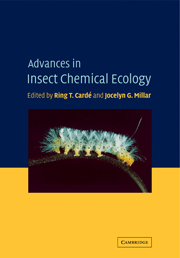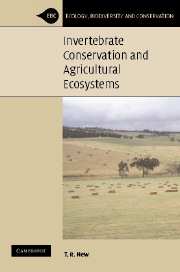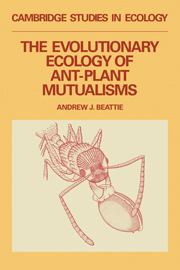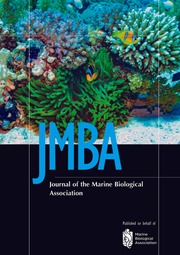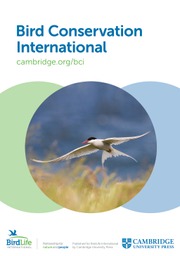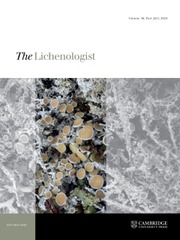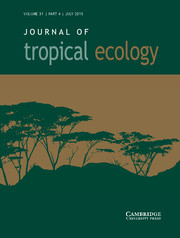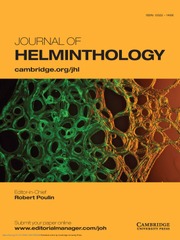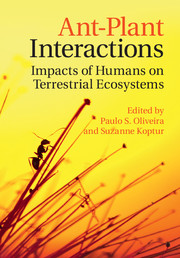
Ant-Plant Interactions
Impacts of Humans on Terrestrial Ecosystems
- Editors:
- Paulo S. Oliveira, Universidade Estadual de Campinas, Brazil
- Suzanne Koptur, Florida International University
- Date Published: August 2017
- availability: Available
- format: Hardback
- isbn: 9781107159754
Hardback
Other available formats:
eBook
Looking for an inspection copy?
This title is not currently available for inspection. However, if you are interested in the title for your course we can consider offering an inspection copy. To register your interest please contact [email protected] providing details of the course you are teaching.
-
Ants are probably the most dominant insect family on earth, and flowering plants have been the dominant plant group on land for more than 100 million years. In recent decades, human activities have degraded natural environments with unparalleled speed and scale, making it increasingly apparent that interspecific interactions vary not only under different ecological conditions and across habitats, but also according to anthropogenic global change. This is the first volume entirely devoted to the anthropogenic effects on the interactions between these two major components of terrestrial ecosystems. A first-rate team of contributors report their research from a variety of temperate and tropical ecosystems worldwide, including South, Central and North America, Africa, Japan, Polynesia, Indonesia and Australia. It provides an in-depth summary of the current understanding for researchers already acquainted with insect-plant interactions, yet is written at a level to offer a window into the ecology of ant-plant interactions for the mostly uninitiated international scientific community.
Read more- The interactions between ants and flowering plants dominate terrestrial ecosystems in both temperate and tropical environments worldwide
- This book is broad in scope and raises relevant ecological questions from an array of topics within ant-plant interactions in altered habitats, indicating ecological and evolutionary consequences, as well as promising research avenues
- Understanding the effects of anthropogenic disturbance on ant-plant interactions facilitates insights into habitat disturbance and change as a threat to the functioning of communities and ecosystems
Reviews & endorsements
'Ant-Plant Interactions is the definitive and greatly needed treatise on a subject of importance to general terrestrial ecology and the study of Earth's dominant social insects.' Edward O. Wilson, Harvard University, Massachusetts
See more reviews'Ants dominate terrestrial habitats worldwide, and their interactions with plants structure biodiversity within those habitats. This edited volume offers a timely, comprehensive treatment of ways in which ecologically diverse ant-plant interactions are affected by, and are responding to, human-induced changes to the landscape. Worldwide in scope and covering topics that cut across basic ecology, agriculture, and conservation, it authoritatively reviews, presents new data, and highlights critical gaps in our nascent understanding of ants' critical roles in terrestrial ecosystems.' Judith L. Bronstein, University of Arizona
'Ants are intrinsically fascinating, so are plants, and their interactions result in evolutionary gymnastics we can hardly conceive of, consequently producing absorbingly wonderful creations. Their study continues to reveal more associational intricacies, as this book documents convincingly. The interrelationships among the most common animals on earth and the swath of green plants covering most of the Earth's land surface contribute significantly to biodiversity and the resilience, maintenance, conservation and stability of ecosystems. Ants provide a wide variety of services in ecosystems: regulatory, provisioning, supporting, and cultural, with a much wider impact than commonly perceived - all with relevance to the welfare of humanity. Basic and applied interests in the topic are broadly represented by a stellar list of internationally recognized authors covering a diversified geographic range.' Peter W. Price, Northern Arizona University
'In summary, because it treats situations from temperate climate regions in addition to the tropics, this volume covers cases that will interest a wide range of readers.' Alain Dejean, The Quarterly Review of Biology
Customer reviews
Not yet reviewed
Be the first to review
Review was not posted due to profanity
×Product details
- Date Published: August 2017
- format: Hardback
- isbn: 9781107159754
- length: 452 pages
- dimensions: 253 x 181 x 25 mm
- weight: 1.06kg
- contains: 173 b/w illus. 29 colour illus. 14 tables
- availability: Available
Table of Contents
Preface. Ants and plants: a prominent interaction in a changing world Paulo S. Oliveira and Suzanne Koptur
Part I. Landscape Mosaics, Habitat Fragmentation and Edge Effects:
1. Ant biodiversity and functional roles in fragmented forest and grassland ecosystems of the agricultural Midwest, North America Thomas O. Crist and Kaitlin U. Campbell
2. Diversity and specificity of ant-plant interactions in canopy communities: insights from primary and secondary tropical forests in New Guinea Petr Klimes
3. Living together in novel habitats: a review of land-use change impacts on mutualistic ant-plant symbioses in tropical forests Tom M. Fayle, Chua Wanji, Edgar C. Turner and Kalsum M. Yusah
4. Ecology of leaf-cutting ants in human-modified landscapes Marcelo Tabarelli, Felipe F. S. Siqueira, Julia Backé, Rainer Wirth and Inara R. Leal
Part II. Ant-Seed Interactions and Man-Induced Disturbance:
5. Global change impacts on ant-mediated seed dispersal in Eastern North American forests Robert J. Warren II, Joshua R. King, Lacy Chick and Mark A. Bradford
6. Effects of human disturbance and climate change on myrmecochory in Brazilian Caatinga Inara R. Leal, Laura C. Leal, Fernanda M. P. de Oliveira, Gabriela B. Arcoverde and Alan N. Andersen
7. Anthropogenic disturbances affect the interactions between ants and fleshy fruits in two neotropical biodiversity hotspots Paulo S. Oliveira, Alexander V. Christianini, Ana G. D. Bieber and Marco A. Pizo
Part III. Ant-Plant Protection Systems under Variable Habitat Conditions:
8. Plasticity and efficacy of defense strategies against herbivory in ant-visited plants growing in variable abiotic conditions Akira Yamawo
9. Interhabitat variation in the ecology of extrafloral nectar production and associated ant assemblages in Mexican landscapes Cecilia Díaz-Castelazo, Nathalia Chavarro-Rodríguez and Victor Rico-Gray
10. Integrating ecological complexity into our understanding of ant-plant mutualism: ant-acacia interactions in African savannas Todd M. Palmer and Truman P. Young
11. Ecological and evolutionary responses of protective ant-plant mutualisms to environmental changes Doyle McKey and Rumsaïs Blatrix
Part IV. Effect of Invasive Ants on Plants and their Mutualists:
12. Playing the system: the impacts of invasive ants and plants on facultative ant-plant interactions Suzanne Koptur, Ian M. Jones, Hong Liu and Cecilia Díaz-Castelazo
13. Biological invasions and ant-flower networks on islands Nico Blüthgen, Christopher Kaiser-Bunbury and Robert R. Junker
14. Mutualisms and the reciprocal benefits of comparing systems with native and introduced ants Joshua H. Ness and David A. Holway
15. Invasion biology and ant-plant systems in Australia Lori Lach
Part V. Applied Ant Ecology: Agroecosystems, Ecosystem Engineering and Restoration:
16. Services and disservices of ant communities in tropical cacao and coffee agroforestry systems Yann Clough, Stacy Philpott and Teja Tscharntke
17. Ant-plant-herbivore interactions in northern neotropical agroecosystems Inge Armbrecht and Ivette Perfecto
18. Leaf-cutting ants in Patagonia: how human disturbances affect their role as ecosystem engineers on soil fertility, plant fitness and trophic cascades Alejandro G.Farji-Brener, Mariana Tadey and María N. Lescano
Part VI. Perspectives:
19. The study of interspecific interactions in habitats under anthropogenic disturbance: importance and applications Martin Heil and Marcia González-Teuber
20. Why study ant-plant interactions? Andrew J. Beattie.
Sorry, this resource is locked
Please register or sign in to request access. If you are having problems accessing these resources please email [email protected]
Register Sign in» Proceed
You are now leaving the Cambridge University Press website. Your eBook purchase and download will be completed by our partner www.ebooks.com. Please see the permission section of the www.ebooks.com catalogue page for details of the print & copy limits on our eBooks.
Continue ×Are you sure you want to delete your account?
This cannot be undone.
Thank you for your feedback which will help us improve our service.
If you requested a response, we will make sure to get back to you shortly.
×
